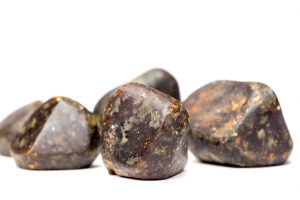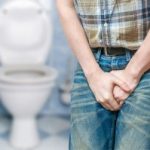 Bladder stones, not to be confused with kidney stones, are formed when minerals inside the bladder lump together and harden. This happens when the bladder doesn’t fully empty itself.
Bladder stones, not to be confused with kidney stones, are formed when minerals inside the bladder lump together and harden. This happens when the bladder doesn’t fully empty itself.
For many, bladder stones may be symptomless. If small enough, they can easily be passed with urination. But in some cases, you may experience symptoms like pain, difficulty urinating, increased urination, and visual changes in your urine.
Advertisement
The good news is, bladder stones can be prevented through natural ways and home remedies. Diet, specifically, plays a large role in bladder stone development and prevention.
Causes and symptoms of bladder stones
Bladder stones may be a result of an already existing problem such as a urinary tract infection. They often form when the bladder is not fully emptying, so the urine that is left behind crystallizes into a stone. As mentioned, underlying conditions can contribute to bladder stones as well, including:
- Enlarged prostate
- Damaged nerves
- Inflammation
- Medical devices like catheters
- Kidney stones
- Damaged urethra
- Weak bladder
Symptoms of bladder stones include frequent urination throughout the day, lower abdominal pain, a burning sensation when urinating, urine that appears cloudy or contains blood, and the inability to control urine.
Risks and complications of bladder stones
 Men are more likely to develop bladder stones than women, especially older men with prostate problems. Although older men are at a higher risk for bladder stones, younger men living in industrialized countries have a fairly high risk as well, because their diet primarily consists of sugar and fat, which can increase the risk of bladder stones.
Men are more likely to develop bladder stones than women, especially older men with prostate problems. Although older men are at a higher risk for bladder stones, younger men living in industrialized countries have a fairly high risk as well, because their diet primarily consists of sugar and fat, which can increase the risk of bladder stones.
Other risk factors for bladder stones include a bladder outlet obstruction when the urine flow is blocked, or neurogenic bladder, a condition in which the nerves become damaged – through stroke, multiple sclerosis, etc. – resulting in the uncontrollable bladder function.
Complications associated with bladder stones include chronic bladder dysfunction (a person feels chronic pain and frequent urination), or recurring urinary tract infections.
Diagnosis of bladder stones
There are numerous tests your doctor can perform in order to properly diagnose bladder stones. These diagnostic tests include:
- A physical examination
- Analysis of your urine (urinalysis)
- CT scan
- Ultrasound
- X-ray
- Special imaging of the urinary tract
Treatment options for bladder stones
 Bladder stones should be removed if they cannot be easily passed through urination. Otherwise, they can lead to complications, such as blockages and further infection. A common procedure to break bladder stones apart is known as cystolitholapaxy in which a small tube with a camera at the end is inserted through the urethra into the bladder to observe the stone. Once located, your doctor uses ultrasound or mechanical devices to break apart the stone into smaller pieces, which can be flushed out.
Bladder stones should be removed if they cannot be easily passed through urination. Otherwise, they can lead to complications, such as blockages and further infection. A common procedure to break bladder stones apart is known as cystolitholapaxy in which a small tube with a camera at the end is inserted through the urethra into the bladder to observe the stone. Once located, your doctor uses ultrasound or mechanical devices to break apart the stone into smaller pieces, which can be flushed out.
When bladder stones are too large to break, open surgery is required, which involves making an incision in the bladder to get the stones out.
To prevent bladder stones, consult with your doctor about any symptoms you may be experiencing, like those resulting from an enlarged prostate, for example.
Your diet can play a role in the formation of bladder stones, too. A poor diet can change the chemistry of your urine, thus increasing the risk of bladder stones. This is why eating healthy is so important for risk reduction.
Advertisement
For starters, your diet should be low in fat and contain a variety of nutrient-rich foods. This means, consuming plenty of fruits and vegetables, whole grains, low-fat dairy, and lean sources of protein like poultry and fish.
Your diet should also be high in fiber, which can be obtained from whole grains and fruits and vegetables, too. Recommended daily fiber intake is two cups of fruit, or two and a half cups of vegetables.
Lastly, you should drink plenty of water to help flush out your bladder. Dehydration and insufficient water intake, on the other hand, can increase your risk of bladder stones. The goal is to aim for at least eight glasses of water a day, but this can vary. A good method to determine how much water you need is to drink one quart of water for every 50 pounds of body weight. For example, if you weight 150 pounds you will need three quarts or two liters.
